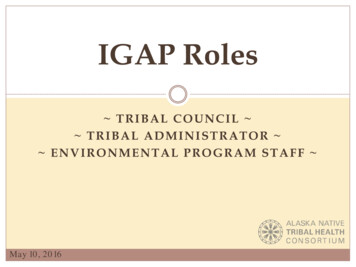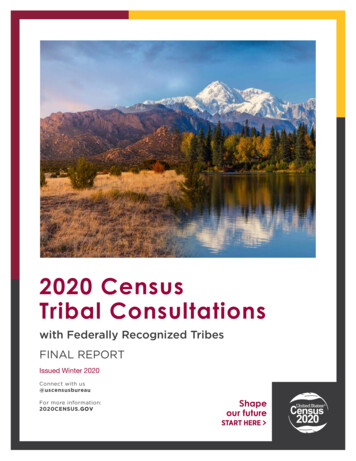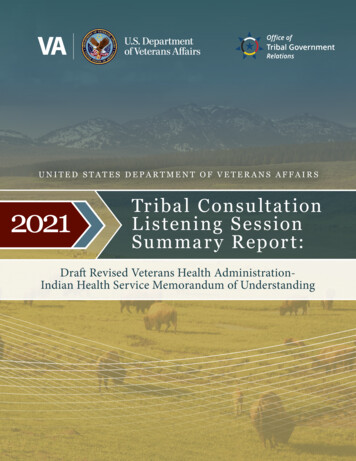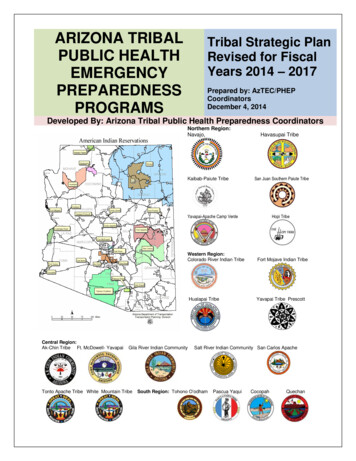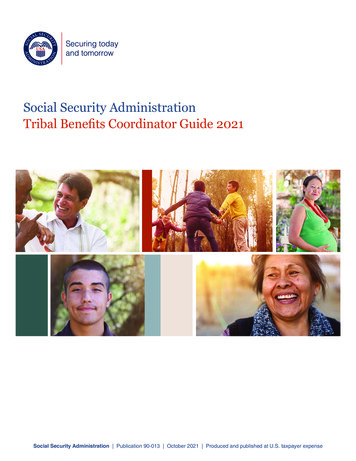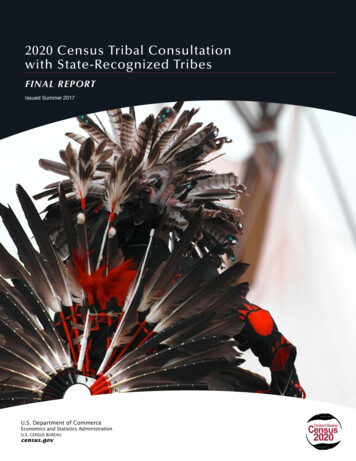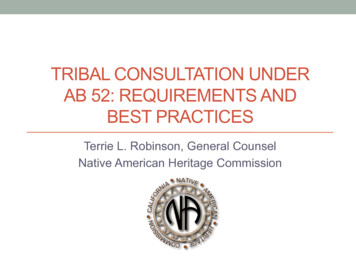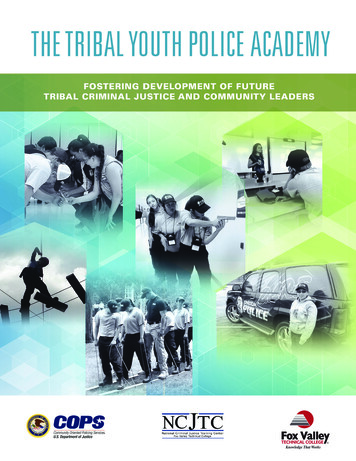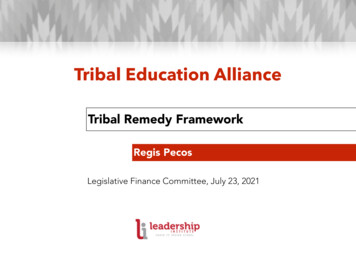
Transcription
OFFICE OF MANAGEMENT AND BUDGETTRIBAL CONSULTATION PLAN OF ACTIONSApril 26, 2021PurposeThis plan implements President Biden’s January 26, 2021, “Memorandum on TribalConsultation and Strengthening Nation-to-Nation Relationships.” That Memorandum directedeach executive department and agency (agency) to develop a detailed plan of actions toimplement the policies and directives of Executive Order (E.O.) 13175, “Consultation andCoordination with Indian Tribal Governments,” which was signed by President Clinton onNovember 6, 2000. E.O. 13175 directs agencies to “establish regular and meaningfulconsultation and collaboration with tribal officials in the development of Federal policies thathave tribal implications, to strengthen the United States government-to-government relationshipswith Indian tribes, and to reduce the imposition of unfunded mandates upon Indian tribes.” TheJanuary 2021 Presidential Memorandum gave the Office of Management and Budget (OMB) tworoles: reviewing other agencies’ plans and subsequent reports to ensure that they comply withE.O. 13175, and submitting an implementation plan to govern its own actions as an agency.OMB is committed to respecting tribal sovereignty and self-governance, honoring the Federaltrust and treaty responsibilities to Tribal Nations, and strengthening the Nation-to-Nationrelationship through regular, meaningful, and robust consultation with Tribal Nations and tribalofficials. This document outlines OMB’s initial plan of actions to implement E.O. 13175.Through regular engagement with Tribal Nations, OMB will review, refine, and add to theseactions, as appropriate, moving forward.OMB’s Current Efforts Relating to Tribal ConsultationThis section briefly describes OMB’s current efforts relating to tribal consultation across OMB’svarious functions. OMB recognizes that there is a great deal of work to do to achieve thepurposes of President Biden’s Memorandum. A description of the plan for initial steps towardcarrying out that work is in a later section of this document. This section focuses on currentactivities.OMB is the largest component of the Executive Office of the President and OMB oversees theimplementation of the President’s agenda across the Executive Branch. OMB carries out itsmission through five main functions across agencies:1. Budget development and execution. OMB has six resource management offices(RMOs), organized by agency and by program area. These offices, together with OMB’sBudget Review Division, help to carry out OMB’s central activity of assisting thePresident in overseeing the preparation of the Federal Budget. The Federal Budgetdevelopment process generally begins in September with agency request submissions toOMB concludes with the issuance of the President’s Budget.1
Both agencies and OMB have the responsibility to ensure that the preparation of thePresident’s Budget reflects tribal input. Currently, OMB RMOs primarily rely onagencies to ensure they have consulted with Tribal Nations and tribal officials indeveloping their budget requests to OMB. Section 51.17 of OMB Circular A-11,Preparation, Submission, and Execution of the Budget 1, requires agencies to include adescription of their tribal consultation processes and tribal input related to budgetdevelopment in their annual budget submissions to OMB.OMB’s RMOs also oversee the execution of the Federal Budget passed by Congress.This includes ensuring that funding designated for tribal assistance is appropriatelyobligated and spent. As a part of this effort, OMB annually collects and releases data onFederal funding that benefits or relates to Native Americans and Alaska Natives throughthe Native American Funding Crosscut.2. Management, including oversight of agency performance, personnel policies,procurement, financial management, and information technology. OMB’smanagement offices oversee and coordinate Federal performance and personnelmanagement, procurement policy, financial management, information technology (eGovernment), and modernization and service delivery efforts, including through theOffice of Performance and Personnel Management (OPPM), the Office of FederalProcurement Policy (OFPP), the Office of Federal Financial Management (OFFM), theOffice of the Federal Chief Information Officer (OFCIO), and the United States DigitalService (USDS).OPPM currently implements E.O. 13175 by engaging with tribal representatives duringformulation of the President’s Management Agenda; collaborating with the FederalPermitting Infrastructure Steering Council 2 (FPISC); and providing assistance withspecific guidelines for agency consultation with Tribal Nations as agencies developstrategic plans, Agency Priority Goals (APGs), and Learning Agendas; and publishingand tracking APGs and Cross-Agency Priority Goals on Performance.gov.OFPP currently supports a number of authorities and Federal organizations that promoteFederal procurement opportunities to qualified American Indian andAlaska Native entities through policies and practices developed through tribalconsultation. These include the Buy Indian Act, authority in the Small Business Act, andthe Small Business Administration’s (SBA) Office of Native American Affairs.OFFM currently engages in robust engagement to ensure that it hears a broad set ofperspectives on Federal financial management needs. As part of this process, OFFM hasreceived tribal input through formal notice and comment on development of guidancethat impacts tribal financial assistance recipients.For more information, please visit: /06/a11.pdf.FPISC works with Federal agencies to improve the environmental review process of large, complex infrastructureprojects, including assisting project sponsors and member agencies with coordination with State, tribal, and localentities that may have permitting, consultation, or concurrence responsibilities for covered projects.122
3. Review of Executive Branch regulations, approval of Federal governmentinformation collections, coordination of the Federal statistical system, andestablishment of statistical standards practices, and development and oversight ofFederal privacy policy. The Office of Information and Regulatory Affairs (OIRA) is astatutory part of OMB. The office comprises six subject matter branches organized by thetype of regulatory agency and information policy subject area.Executive Order 12866, “Regulatory Planning and Review” 3 emphasizes the importanceof engaging with tribal governments and tribal officials in the course of regulatorydevelopment and review and ensuring that regulatory approaches respect the role of tribalgovernments. E.O. 13175 sets forth additional consultation and other requirements that anagency must satisfy before promulgating regulations that have tribal implications andrequires OIRA review the tribal summary impact statement included in the regulationpreamble under E.O. 13175 Sec. 5. As part of OIRA’s review of significant regulatoryactions, OIRA currently evaluates agency compliance with E.O. 12866 and E.O. 13175.OIRA also engages in E.O. 12866 meetings with any interested parties, and thesemeetings have been regularly used by tribal representatives and members as listeningsessions to provide feedback on regulatory actions under review.4. Clearance and coordination of legislative and other materials, including agencytestimony, legislative proposals, and other communications with Congress, as well ascoordination of other Presidential actions. These functions are primarily carried out byOMB’s Legislative Reference Division (LRD), in coordination with other OMB offices.OMB’s legislative clearance function allows for all affected agencies to engage andreconcile differences on legislative proposals and communications that are cleared andtransmitted to Congress. Among the goals of the clearance process are to ensure thatagencies’ legislative communications with Congress are consistent with the President’spolicies and objectives.5. Clearance of Presidential Executive Orders and memoranda to agency heads priorto their issuance. These functions are primarily carried out by OMB’s Office of GeneralCounsel, in coordination with other OMB offices.Designated OMB OfficialIn guidance for Implementing E.O. 13175 issued January 11, 2001 4, and again in guidanceissued on July 30, 2010 5, OMB designated OIRA as the office with “primary responsibility forimplementing this order.” The President’s January 26, 2021 Memorandum directs that eachagency’s plan “shall designate an appropriate official to coordinate implementation of the plan.”For more information, please visit: ecutive-orders/pdf/12866.pdfFor more information, please ault/files/omb/assets/omb/memoranda/m01-07.pdf5For more information, please v/files/omb/memoranda/2010/m10-33.pdf343
After review of its internal functions, OMB now co-designates its General Counsel and theAssociate Director for Climate, Energy, Environment, and Science Programs as the officials withprimary responsibility for implementation of OMB’s plan of actions.Tribal Consultations to Inform the Development of OMB’s Plan of ActionsThe President’s January 26, 2021 Memorandum directs agencies to develop their plans of actionsafter consultation with Tribal Nations and tribal officials as defined in E.O. 13175. OMB heldtwo formal tribal consultations, on April 2, 2021, and April 5, 2021, to inform the developmentof this plan. Over 250 tribal leaders and other officials participated in the consultations acrossboth days, and OMB received more than 40 letters with written comments from tribalgovernments and organizations.Tribal leaders provided valuable feedback during these consultations and in their writtensubmissions. Many leaders suggested OMB create a senior position or office focused on tribalissues to ensure better coordination and engagement, and establish an OMB-tribal advisorycommittee to foster meaningful and regular engagement with Tribal Nations. Tribal leadersnoted that OMB should delineate a specific and robust consultation policy, including parametersfor appropriate prior notice, agendas, thorough briefing materials, written comment periods, andpost-consultation responses to comments made during the consultation, in order to engage inmeaningful consultations.Further, tribal leaders described the need for centralization and standardization of informationacross the Federal government, both in tribal consultation policy and data about resourcesprovided to Tribal Nations. Feedback also included the need for training for Federal staff ontribal sovereignty and priorities to ensure that Federal-tribal engagement is meaningful andproductive. The leaders also urged that stronger OMB oversight of Federal agencies is importantto ensuring agencies across the government appropriately maintain Nation-to-Nationrelationships in policymaking.Tribal leaders also provided feedback specific to each of OMB’s five major functions. Thefeedback included: For budgetary functions, tribal officials should be consulted throughout the Budgetformulation and execution process to ensure tribal funding priorities and needs are met. For management functions, comprehensive, consolidated metrics and policy effects onTribal Nations by agency would help Tribal Nations better understand and plan forFederal support and impacts on their communities. Tribal leaders also commented thatOMB should strengthen oversight and use of existing Federal procurement levers,including policies and regulations that encourage procurement directly from TribalNations and tribal business. For regulatory functions, OIRA's regulatory review process should ensure thatregulations do not: conflict with tribal government treaties or statutes; undermine thegovernment-to-government and trust relationship; impose undue burden on tribal entities;or restrict tribal eligibility for Federal program benefits. Tribal leaders also emphasizedthe need for OIRA to ensure that regulations incorporate tribal recommendations andinput and that agencies have engaged in adequate tribal consultation if appropriate.4
For legislative functions, Tribal Nations should be consulted on legislative proposals andmaterials and OMB should support legislation to codify tribal consultation.For Presidential executive orders and and memoranda, consultation should occurthroughout the development process to ensure that all information, including the potentialimpacts, are communicated to Tribal Nations.OMB Plan of ActionsOMB is committed to meaningful and robust engagement with Tribal Nations. The purpose ofthis plan is to identify the initial actions OMB will take to implement the policies and directivesof E.O. 13175 informed by the valuable feedback OMB received during its consultations. OMBintends to periodically review and update this plan of actions, informed by regular, meaningful,and robust consultation with Tribal Nations and tribal officials, moving forward.OMB has identified the following actions it will take to implement the policies and directives ofE.O. 13175:1. Improve Executive Branch Compliance with E.O. 13175. The January PresidentialMemorandum tasks OMB, in coordination with the Domestic Policy Council (DPC), withreviewing agency tribal consultation plans, and agencies’ subsequent progress reports ontheir implementation of E.O. 13175. In addition, it directs OMB and DPC to submit areport to the President within one year on agencies’ implementation, identifying anyrecommendations for improvement, if necessary. To the fullest extent possible, OMB willenforce the directives and deadlines of the Presidential Memorandum across agencies,and ensure the report it prepares for the President in coordination with DPC reflects athorough review and analysis of agencies’ compliance.Additionally, offices across OMB will work to promote agencies’ compliance with E.O.13175 as follows: OIRA will consider issuance of further guidance to regulatory agencies, periodicreminders to agencies concerning their obligations under E.O. 12866 and E.O. 13175,and internal guidance and training on matters related to appropriate and effectivetribal consultation practices. OPPM will review FPISC’s initiatives to improve coordination between the FederalGovernment and Tribal Nations for large, complex infrastructure projects. OPPM will encourage agency Performance Improvement Officers to work withagency leadership in their tribal consultation efforts during the formulation of theirstrategic plans, APGs, and Learning Agendas. LRD plans to provide educational guidance to encourage agencies to factor in tribalconsiderations when developing, submitting, and reviewing materials circulated foragency review and clearance.2. Consider the Establishment of a Tribal Affairs Advisor. During OMB’s consultationsand in the written comments received following the consultations, the vast majority oftribal leaders advocated for OMB to establish a tribal affairs position to coordinatepolicies and functions with tribal implications. In the coming months, OMB will consider5
options to meet this recommendation, as well as the complementary recommendation thatOMB establish an OMB-tribal advisory council.3. Regular Consultations with Tribal Nations and Tribal Officials. Within theconstraints of confidential, deliberative, and pre-decisional information across OMBfunctions, OMB will hold consultations with Tribal Nations and tribal officials regularlymoving forward. Anticipated consultation topics include: budget development andexecution, regulatory actions, legislative actions, development of the President’sManagement Agenda, Federal financial assistance and real property, and executiveactions.Specifically, the Deputy Director or designee will conduct at least one tribal consultationannually before the Budget is finalized to inform budget development and one tribalconsultation annually after the President’s Budget is announced to collect feedback andinform Budget implementation.4. Develop an OMB Consultation Policy. To maintain consistency among consultationsplanned by OMB components, OMB will develop an internal policy for facilitatingmeaningful tribal consultations, as recommended by several tribal leaders. This policy isexpected to include standards for notice to tribal leaders, agendas, OMB leadershipparticipation, and post-consultation actions.5. Additional Information on Tribal Funding. OMB currently collects summary datafrom across the Federal Government about funding for programs and activities servingNative Americans through the annual Native American Funding Crosscut 6. OMB willreview this data collection exercise to consider collecting more detailed informationabout resource levels, programs offered, and specific recipients to promote transparencyin Federal funding to and programs that serve Tribal Nations.6. Policy and Procedure Review. OIRA will review its policies and procedures to ensurethat the requirements of E.O. 12866 and E.O. 13175 related to regulations affecting tribalgovernments are being fully and consistently implemented, including evaluating how topublicly convey regulatory compliance with E.O. 13175. For example, at conclusion ofE.O. 12866 review, OIRA could make a determination regarding whether the agencycomplied with E.O. 13175 Sec. 5, and this determination could be included in theregulation conclusion information publicly released on Reginfo.gov.7. Identification of Legislation of Potential Interest to Tribes. LRD plans to devise asystem for identifying legislation of interest to Tribes.In addition to the above actions, all OMB components will consider, informed by tribalfeedback, what other actions they can take to foster greater engagement with Tribal Nations andtribal officials moving forward.For the most recent information collected, please ads/fy2021nativeamerican-crosscut.pdf.66
Next StepsPursuant to the President’s January 26, 2021 Memorandum, OMB will provide a progress reporton its implementation of the actions in this plan within 270 days.7
after consultation with Tribal Nations and tribal officials as defined in E.O. 13175. OMB held two formal tribal consultations, on April 2, 2021, and April 5, 2021, to inform the development
